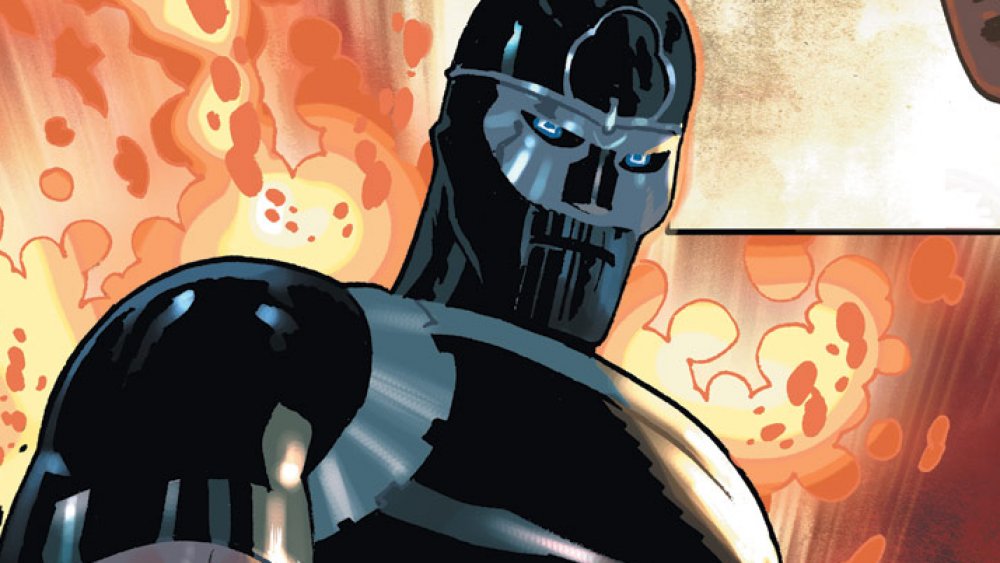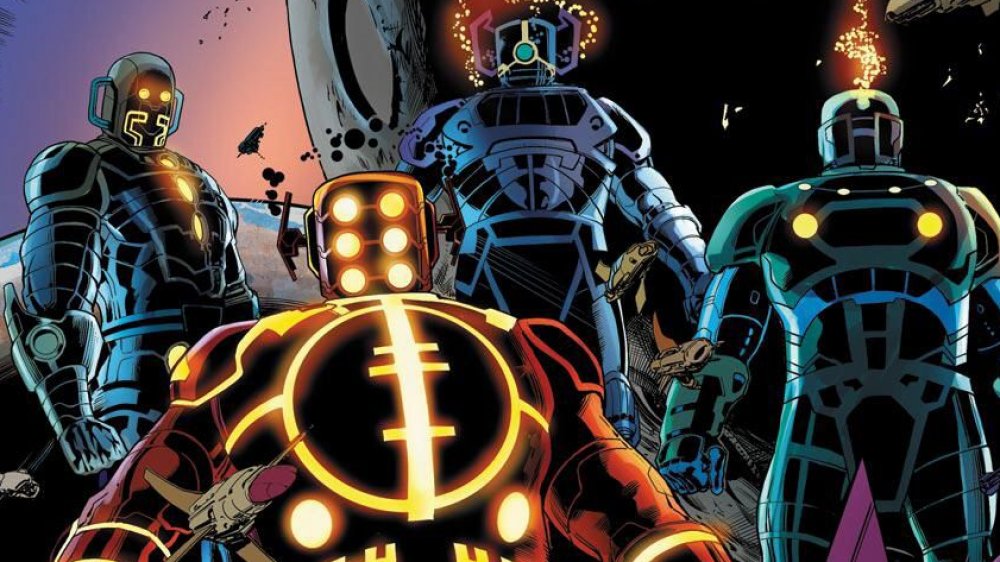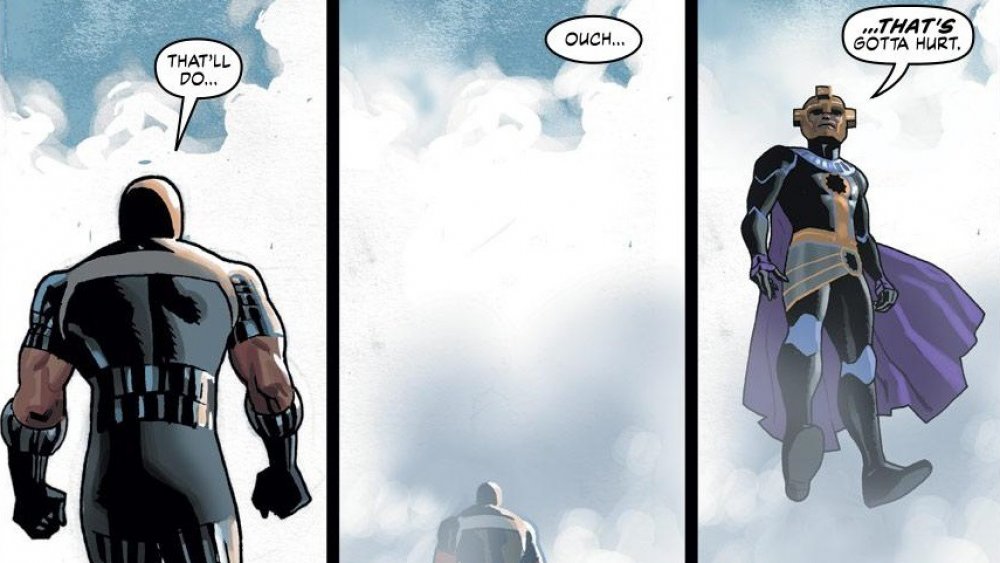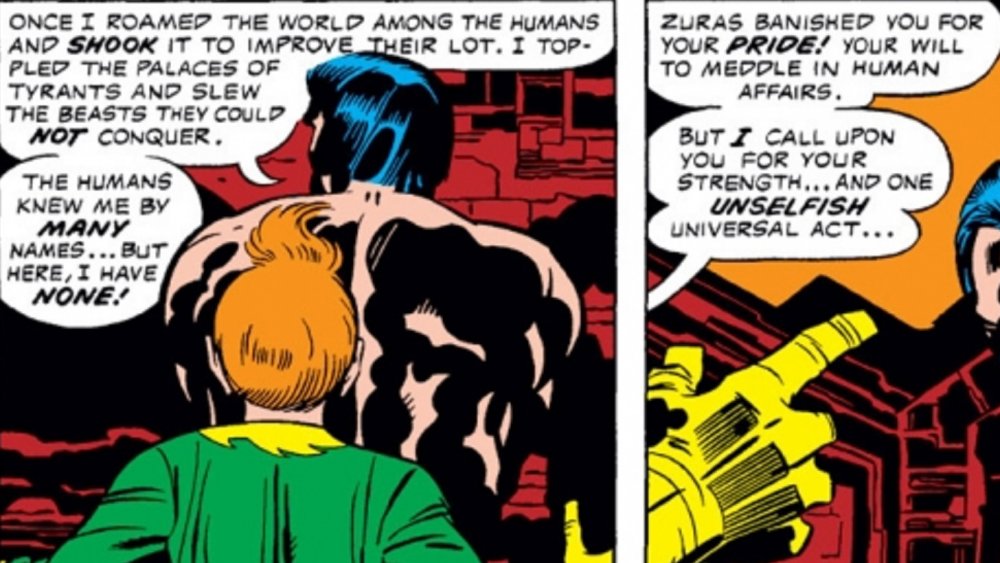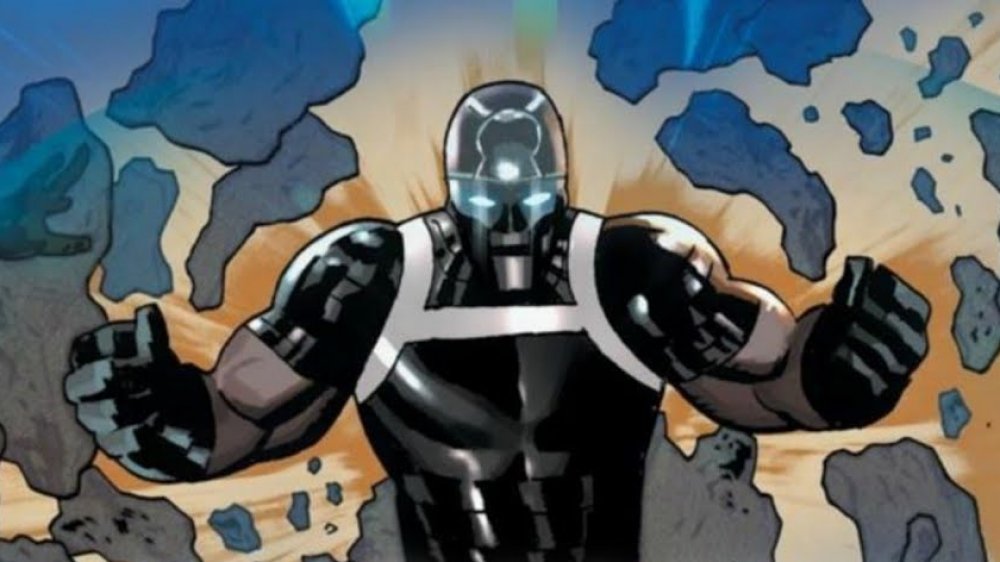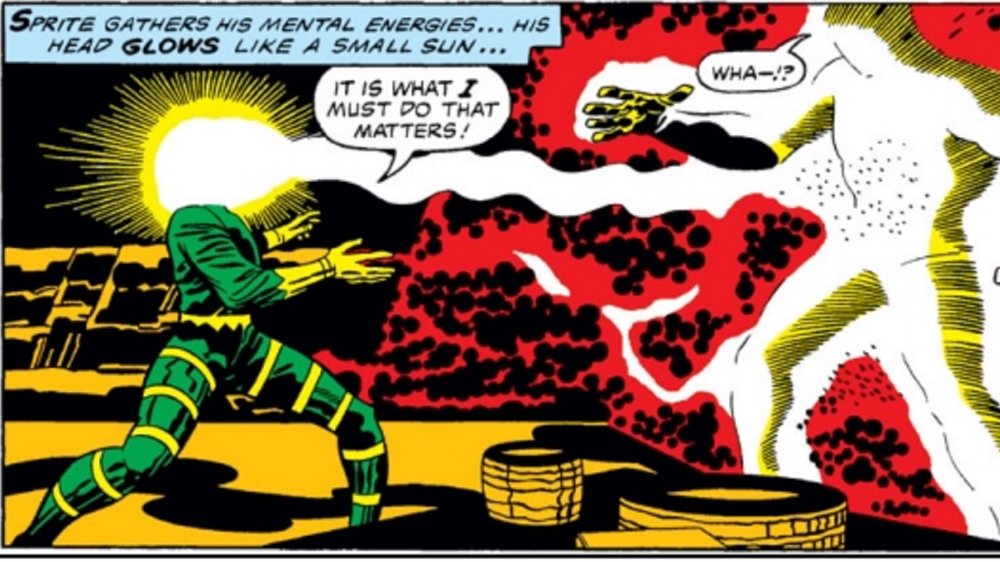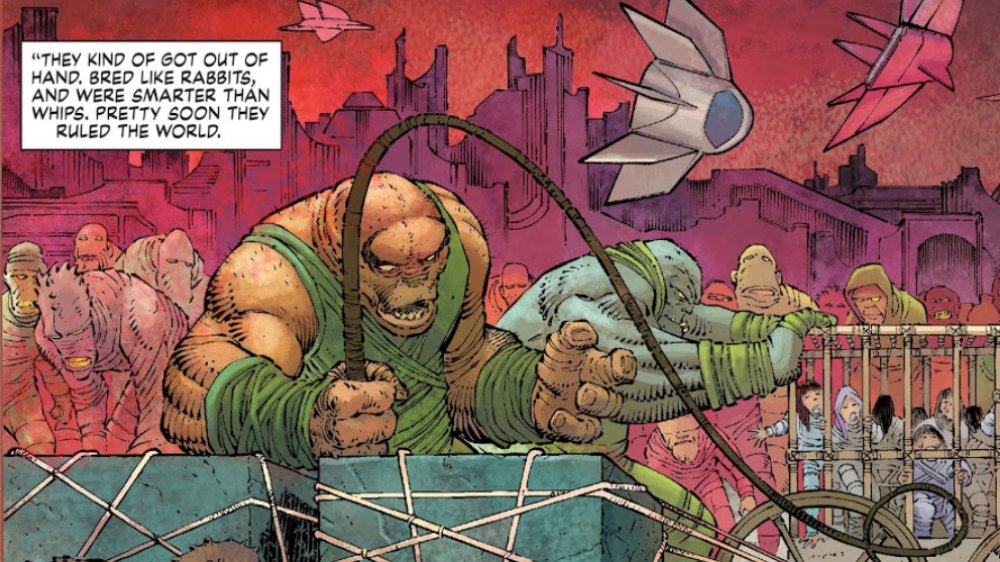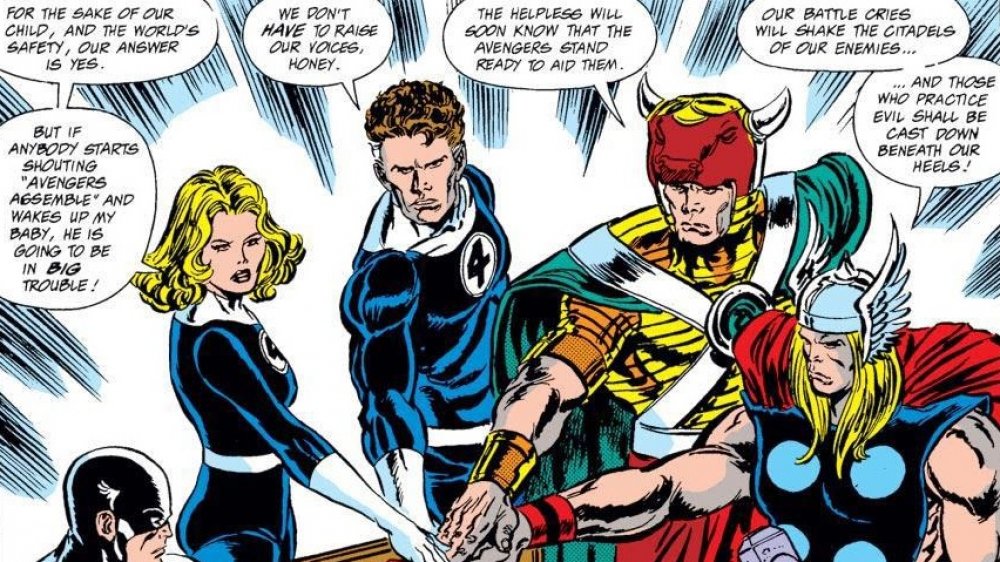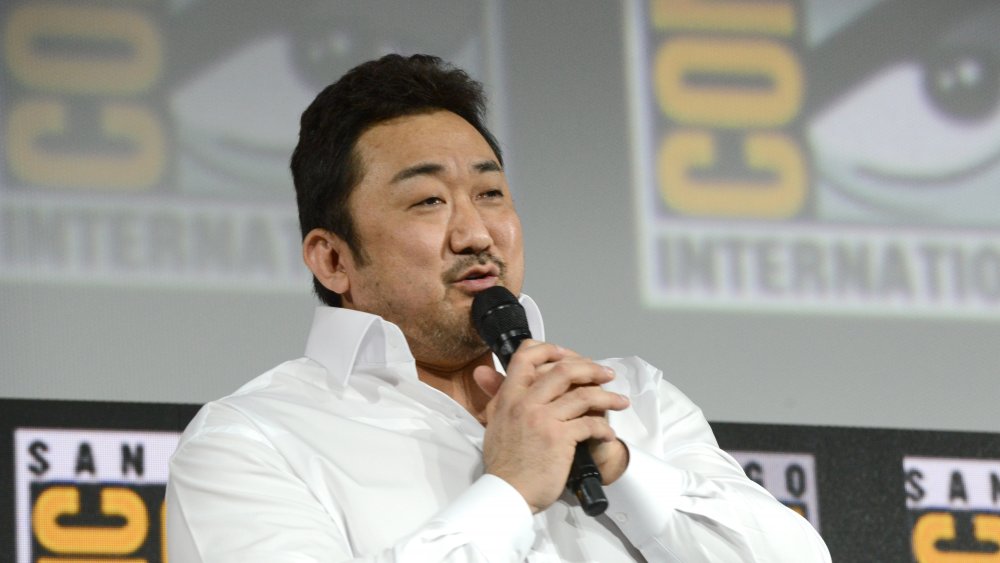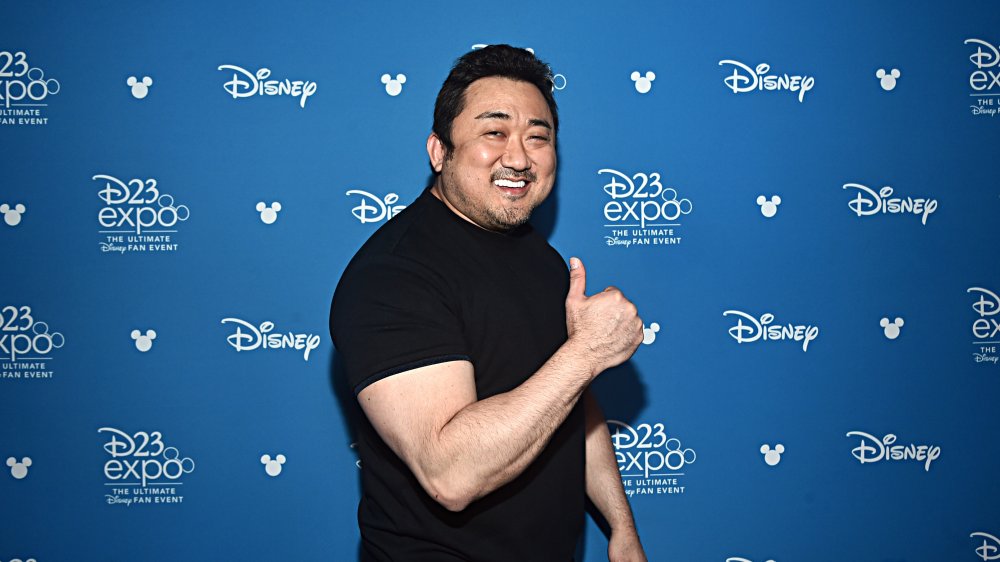Marvel's Gilgamesh: What You Need To Know About The Eternal
The MCU, which has grown larger than ever, is poised to become truly cosmic with the arrival of 2021's Eternals. Based off a psychedelic 1970s series by the one and only Jack Kirby, it is, in the parlance of its era, extremely far-out. The short-lived series is not a widely beloved or particularly well-known part of the Marvel canon — "Days of Future Past" or "Civil War" this ain't. No, the tale of the Eternals is the domain of Marvel obsessives. But bringing it to the big screen will provide the MCU with a fabulous new playground to stomp around in, brimming with vibrant aesthetics, intriguing characters, and interstellar stakes.
The Eternal known variously as the Forgotten One, Hero, and Gilgamesh is a great example of the Eternals' appeal: He's mythic, yet individually distinct, visually arresting, and embroiled in some seriously high-stakes drama. To understand the next era of Marvel movies, you have to understand Gilgamesh, and we're here to give you all the detail you need.
Explaining the Eternals
So, who are the Eternals, exactly? The titular heroes of Marvel's upcoming film are immortal beings who have been living on Earth since prehistory. They were placed on the planet as part of an experiment by an even more advanced group of interplanetary beings known as the Celestials. These Celestials were themselves the creation of an all-powerful entity known as the First Firmament that was originally, in and of itself, the entire universe. It's pretty much cosmic demigods all the way down.
The Celestials, eager to experiment with life of their own design, tinkered with early humans until they developed two distinct races: The humanoid and immensely powerful Eternals and the deformed and mutation-prone Deviants. The Eternals built cities away from humanity, so that their strength and agelessness would not be questioned by humans. The Deviants, fueled by their rapid mutation, conquered the planet, their domination eventually broken by the Celestials' return. Centuries passed, through which the Eternals endured. Some maintained their distance from humanity, but some did not. Gilgamesh was of the latter group. Though he is an Eternal, he was seemingly unaware of their fact throughout his early life. His closeness to humanity would eventually land him in trouble with the leadership of the Eternals.
Brushes with humanity
Gilgamesh wandered the Earth for centuries, using his incredible strength, stamina, and martial skill to carve an impressive trail across the newborn planet. He's widely considered to be the strongest of the Eternals, and his incredible powers garnered him fame across civilization, inspiring many myths, legends, and fables. Notably, he's not named Gilgamesh as a nod to the ur-hero and ancient king of Uruk — he is that Gilgamesh, still living and breathing on Earth as our archaeologists uncover old stories about his accomplishments.
A variety of other epic heroes have their origins in this one immortal being: He's the inspiration for the story of Beowulf in Marvel's version of Earth, and is frequently confused with his buddy Hercules and the biblical strongman Samson. His travels took him far and wide, and thus his questing and beast-slaying became known the world over. It's almost easier to count the stories of epic heroism that haven't been impacted by him than it is to number the ones with roots in his feats.
A man of many names
It's easy to see how humans could get their wires crossed with regards to Gilgamesh. His life spans centuries, after all, allowing him to rack up great feats to a degree that is mindbogglingly impossible for any average human. Plus, he wasn't even the only superhuman roaming the world at the time — Earth was practically lousy with them, and he became friends with many of them over the years. When Gilgamesh decided to team up with some of his most legendary buddies, he pretty much ensured that stories of their achievements would end up muddled.
Who, exactly, were the strongmen of legend Gilgamesh hung out with? He fought alongside Achilles, once took the burden of Atlas on his back, and even carried out some of Hercules' heroic labors himself. It's a matter of record that he cleaned out the Augean Stables for Herc, without the fabled hero even asking. He did it in much the same way that Hercules was said to, diverting the river Alpheus through the building to wash away 30 years of muck from thousands of animals. It seems that when the time came to tell the story, the writers of Greek myths simplified the legend.
Bottled up
With so many stories of Gilgamesh's feats circling the globe, it was only a matter of time before the isolationist Eternals bristled at his continued meddling in the affairs of humans.
The Eternals had already fought a civil war internally over whether or not they should be shepherds of humanity or rule over Earth's people in the same way that the Celestials once ruled them. When the pacifists won, the Eternals built several mountain cities to hide out in, away from the world. Gilgamesh ran up against everything the Eternals' leadership believed. Eventually, it was decided: He had to be stopped.
The Eternals' leader Zuras captured Gilgamesh, and essentially put him under house arrest. He was sentenced to live in one section of the Eternals' main city of Olympia. The other Eternals were instructed not to enter his portion of the city, leaving him entirely alone for centuries. Zuras claimed that this harsh punishment came because Gilgamesh was astoundingly prideful and did not want to lose the fame that his interactions with humanity had granted him. As such, he was left without any interaction at all. This was an exceedingly cruel punishment for the most sociable of all the Eternals.
Returning to the fold
Gilgamesh's distance from the rest of the Eternals would come in handy when nearly all of them were incapacitated in a war between the Deviants and the Celestials. Thousands of years ago, the Eternals formed the Uni-Mind, a cosmic merging of their consciousnesses. The Deviants, knowing an opportunity when they saw one, launched a plan to exact vengeance on their creators, the Celestials, by creating a bomb capable of destroying the Celestial mother ship.
Sprite, an Eternal who stayed behind to hold the fort on Earth, realized that they needed to let Gilgamesh loose if there was to be any hope of stopping the attack. Sprite freed Gilgamesh, who traveled to the spaceship of the Celestials ahead of the Deviant spacecraft carrying the massive bomb. From there, Gilgamesh teleported onto the Deviant ship, destroyed the bomb, and was left floating in space. Though Eternals can heal from nearly anything, they're not totally immune to harm, and the blast left him temporarily blind. The Celestials brought him back to their ship and the Eternals returned to Earth. Disaster had been averted.
Playing all sides
Gilgamesh was given a secret mission by the Celestials in the wake of his heroism. While the purpose of the mission has never been fully explained, it's clear that it had something to do with the Celestials' continued experiments on their creations. Gilgamesh also delivered two messages on behalf of the Celestials, one to the Eternals and one to the Deviants. While we have no idea what Gilgamesh said to the Eternals' enemies when he visited them in their underwater city of Lemuria, we do know what he told the heroes of the series. The directive from the Celestials to the Eternals was simple: Stay out of our business. The Eternals' whole schtick is being the favored people of their creators, so they happily obliged.
Once Zuras realized what Gilgamesh had done on behalf of Earth, he decided to lift the order exiling him to a corner of the city. He also renamed him Hero, though Gilgamesh would come to reject this name after years of further questing.
Joining the Avengers
Though Gilgamesh was allowed back into Eternals society, centuries of isolation and his natural penchant for traveling among the humans made him a bit of an outcast among his immortal brethren. Gilgamesh picked up his vagabond ways in short order, and just so happened to be in New York when an attack brought him to the attention of the Avengers.
As demons invaded the city (chronicled in Marvel's "Inferno" storyline), Gilgamesh teamed up with a number of NYC superheroes to fight back, and, critically, save Mr. Fantastic and the Invisible Woman's son. The heroes decided to reform the Avengers, and went on a number of mission together. Eventually, however, Gilgamesh's time on the team came to an end. He was seriously injured during two battles, one with the Lava Men and another with the Negative Zone's explosively powered Blastaar. The Avengers took him back to Olympia to rest and recover. This proved fatal for Gilgamesh, who was kidnapped and then killed by the villain Immortus. Given that this is comics and he's an Eternal, however, he didn't stay down for long, quickly being reborn into a new body. Recent stories have seen Gilgamesh continue to be the human-loving Eternal he is — he's even spent some time crashing on Hercules' couch.
Journeying onto the silver screen
Though Gilgamesh is a bit of a background character, he's poised to take on a larger role in the Eternals movie. Alongside Eternals including Ikaris, Sersi, and Sprite, Gilgamesh will make his big screen debut in 2021, portrayed by actor Don Lee — but he won't be the only minor Eternal to gain greater prominence in the MCU. The legendary hero will be joined by several oddities of the old property, including Kumail Nanjiani's Kingo, an Eternal who enjoys international fame as a Bollywood action star, and Brian Tyree Henry's Phastos, a brilliant inventor. The relative lack of public knowledge around these characters has allowed the MCU movie-makers to play with the characters in ways they couldn't with roles like Captain America. For example, Kingo's character, in the comics, is an Eternal who makes his home in Hokkaido, who comes to fame playing samurai characters in Japanese film. Will similar changes be in store for Gilgamesh? Fans are eager to find out.
A breakout role for Don Lee
Ma Dong-seok, also known as Don Lee, is a Korean-American actor who earned major international recognition for his work in the zombie horror smash, Train to Busan. Prior to that film, he'd gained no small amount of fame for his work in South Korean cinema, especially in crime and gangster films. Lee excels at playing the tough guy, and it's no mystery as to why — Lee has also worked as a personal trainer and has experience in the world of mixed martial arts.
Though critics have praised his performances, he's far from well-known on this side of the world. Putting him in front of American audiences is bound to up his profile, especially given Marvel's penchant for keeping stars employed as the content mill grinds on. Lee has been relatively quiet about his role in the film, but his Instagram posts reveal that he's very excited about bringing Gilgamesh to the big screen. A real-life strongman playing a legendary strongman — what's not to love?
